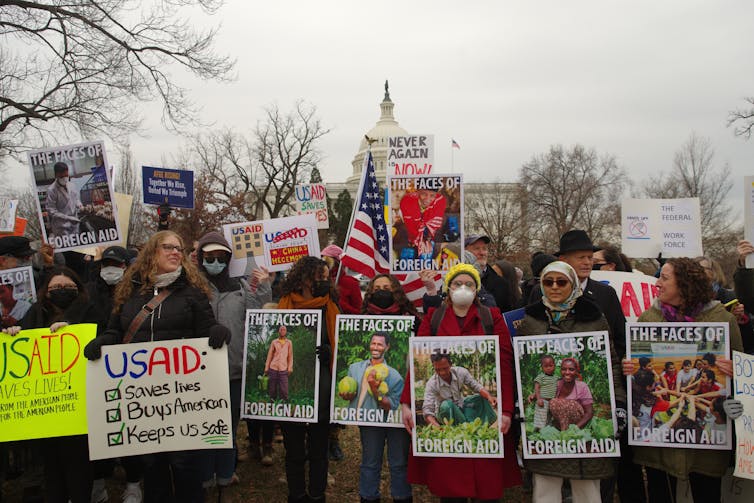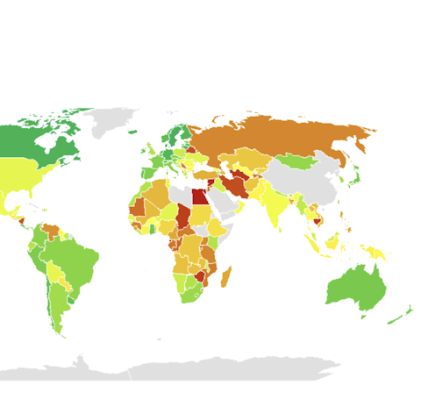How aid cuts may be affecting humanitarian workers
Humanitarian work takes a profound emotional toll on workers. It places them at the frontline of global crises, at times witnessing the devastating impacts of war, famine, natural disasters, mass displacement and systemic injustice. Humanitarian workers have to cope with emotional exhaustion and burnout, with stress levels in some humanitarian settings comparable to those in combat zones.
The emotional burden deepens when workers feel unable to live up to the very values that initially drew them to the sector. It can be emotionally painful for people to watch aid fail, or to carry out policies they believe are wrong.
Psychologists refer to this distress as moral injury — a form of psychological, emotional and spiritual distress that arises when people perpetrate, witness or fail to prevent actions that violate their deeply held moral beliefs. Moral injury arises from guilt, shame, betrayal and anger. This is often directed at others and sometimes at oneself for participating in a harmful system.
As governments cut foreign aid, this disillusionment is likely to worsen. In our 2023 study published in Displaced Voices, we interviewed aid workers across international organisations and charities working in Calais and Dunkirk.
Get your news from actual experts, straight to your inbox. Sign up to our daily newsletter to receive all The Conversation UK’s latest coverage of news and research, from politics and business to the arts and sciences.
Participants shared their experiences of working in environments where they feel they are no longer making a positive impact — or where they must conform to work within systems they perceive as failing those who need assistance. Recent aid cuts are likely to exacerbate these sentiments.
In the UK, Keir Starmer announced aid would fall from 0.5% to 0.3% of gross national income by 2027 — the lowest level since 1999 — to fund increased defence spending.
In the US, the Trump administration suspended over 90% of USAid contracts worth around US$60 billion (£44 billion) — halting support for HIV treatment, reproductive health and crisis response. These cuts represent significant structural blows to humanitarian infrastructure. From mass layoffs in Kenya to the sudden closure of programmes worldwide, the consequences have been immediate and demoralising.
Funding cuts don’t just disrupt operations, they erode the mental and moral resilience of humanitarian workers. Without support for their wellbeing, the sector’s ethical and effective functioning is at risk. Yet research on humanitarian mental health, especially moral injury, remains limited.
Aid worker distress
Based on our experience researching the sector, we expect that recent aid cuts in the UK and US will deepen moral injuries among humanitarian workers.
In an ongoing pilot study, we are examining how aid cuts impact the psychological wellbeing of humanitarian workers. We have analysed 15 publicly available sources (ten blogs and five podcasts) created by aid professionals between 2023 and 2025. While the findings are not yet published, our observation reveals clear patterns of distress linked to moral injury.
We have also observed some evidence of moral injury stemming from the aid cuts. Some workers expressed moral fatigue – slow exhaustion caused by ethical strain, and a sense of futility and loss of meaning. One practitioner wrote in a blog: “I used to believe we were helping — now I feel like I’m sweeping water uphill.”
Several blog posts and podcast episodes suggested a sense of complicity; the pain of being part of organisational silence or failure. Workers spoke of “being the face of a broken system” or “used to justify programmes we knew were failing.” As one put it: “Being a human is messy; serving humanity is messier.”
Still others described the ethical vacuum left by aid cuts, where workers are expected to care without mandate or resources.
Protesters in the US gather in opposition to the USAid cuts.
Philip Yabut/Shutterstock
Our findings so far reveal a troubling overlap between ethical strain and systemic failure in the humanitarian sector. As aid budgets shrink and resources dwindle, workers are overwhelmed, emotionally disoriented and psychologically vulnerable — often forced to choose between compromise and burnout.
Some may leave the sector; others will stay, but with hardened hearts. We’ve seen this first-hand through our work on the UEL Mental Wellbeing Portal, where professionals share stories of programme closures, job loss, grief and a deep sense of powerlessness — echoing our pilot-study findings.
A sustainable (and compassionate) aid system must urgently recognise and address the psychological toll of working in a system that workers feel no longer aligns with their humanitarian values. This crisis of moral injury is not inevitable. The sector needs investment not just in operations, but in the people who carry them out. That starts with understanding and acknowledging the emotional cost of aid cuts.
Lucia Berdondini: I received funding from DifD in 2010, the British Council in 2011 and the Academy of Medical Sciences in 2020. I am an Associate Professor at the University of East London, where I lead the MSc in Humanitarian Intervention (Distance Learning) and the UEL Mental Wellbeing Portal for Humanitarian Workers. I also collaborate with NGOs and academic institutions in the humanitarian field. These affiliations are relevant to the subject of this article.
Nomsa Sandra Wayland does not work for, consult, own shares in or receive funding from any company or organisation that would benefit from this article, and has disclosed no relevant affiliations beyond their academic appointment.


